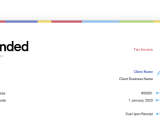
Protecting your mental health as a freelancer
It’s tough running a business – especially when you’re doing it all on your own. We sat down with Honni Hayton, solo business owner and experienced counsellor, to get her best tips for looking after your mental health.
Article contents
− +- Introduction
- Honni’s journey as a solo business owner
- Setting boundaries between work and personal life
- Dealing with stress caused by uncertainty and unsteady income
- Preventing burnout as a freelancer
- Staying motivated in times of low inspiration
- Dealing with imposter syndrome as a freelancer or sole trader
- The importance of delegating
- 5 STEPS to self-care for solo business owners
- Bonus: Honni’s thoughts on Rounded
- Get in touch with Honni Hayton

In our chat, we covered 6 main challenges for freelancers and sole traders:
Setting better boundaries between work and personal life
Dealing with stress caused by uncertainty and unsteady income
Preventing burnout
Staying motivated in times of low inspiration
Dealing with imposter syndrome
Practicing real self-care
Watch the full interview below:

Honni’s journey as a solo business owner
Honni opened her counselling practice in Boonah, Southeast Queensland, six years ago after being made redundant from the NGO she worked at. While she was initially devastated, she’s come to see it as a blessing.
I had been running my practice part time for many years and always wanted to run it full time, but was hesitant. Being made redundant was the push I needed. Now I'm doing what I absolutely love. I get to help other business owners navigate their challenges and really help them get their mindsets right for success.
Honni specialises in helping business owners manage work-life balance and the pressures of being self-employed. She has assisted people in a variety of industries, including mechanics, florists, swimming coaches, as well as professionals such as dieticians and other counsellors.
Setting boundaries between work and personal life
Many solo business owners struggle with work-life balance, and it’s one of the most common challenges Honni helps her clients with.
Here are her 3 top tips for setting better boundaries:
1. Have designated work hours
Many solo business owners have felt the drive to work all the time – Honni included.
When I started my own practice, I was working way too many hours. My kids remind me that I did some 17-hour days and that didn't really work for me. I started to burn out, so I really took an objective look at my hours.
Now, Honni only sees clients from Monday to Thursday between 9am to 5pm, using Fridays to work on her business. She stresses the importance of having clear working hours – and most importantly, communicating these to people.
Another tactic Honni suggests is to separate yourself from your brand outside of working hours. For instance, removing business advertising from your car can help create a healthier divide between work and personal time.
If you're at your child's soccer game, people might approach you about work. By taking the advertising off your car, you can clearly communicate that you're not available for work at that time.
2. Have a designated work space
If you have your own office away from home, leave work there as much as possible.
For those who work from home, Honni stresses the importance of having a dedicated workspace:
If you're lucky enough to have an office, that's great. If you haven't got room for an office, just have a space. Even if it’s a corner of a room that you might be able to set off with dividers or furniture, you know that when you go there, that's when you're at work and when you're away, you're not at work.
3. Be mindful of technology use
If possible, get two phones: one for work and one for personal use. This will make you less accessible and reduce your likelihood of checking messages and emails when off work.
If you do have one phone, Honni recommends setting solid boundaries, such as turning notifications off and avoiding calls outside of work hours.
Dealing with stress caused by uncertainty and unsteady income
For many solo business owners, uncertainty around income and the future of their business can be a major source of pressure.
You don't have that fortnightly wage turn up in your bank account like you do when you work for someone. And that inconsistency can really make you feel uncertain about the future. But it is something that we have to manage and it is a mindset we can work on as business owners.
Honni highlights that we need to learn the difference between stress and anxiety, as they have different causes and are dealt with differently:
Stress is the body's reaction to a specific challenge, something outside us that's stressing us, and that might be something like a financial issue you're having. Anxiety is more like an internal fear or worry about something that doesn't have a specific cause.
With stress, because it's something outside ourselves, that's when we can manage what's happening outside. So if you're having concerns about your cashflow, go and get some help from a financial planner. Ask for assistance.
However, if you’re experiencing anxiety—feeling fear and worry all of the time with no specific outside cause—Honni suggests a different approach:
For anxiety, we look at calming the nervous system through things like mindfulness, relaxation exercises, even cognitive behavioural strategies. So it's quite different to how we manage it. I'd also recommend if you do have anxiety that you seek professional help. Get counselling to help you manage it and and work through it.
Honni does note that not all stress is bad.
We actually need a little bit of stress to get us working, to get us out of bed. And there's sort of a sweet spot where there's just the right amount of stress which maximises our productivity. But if we have too much stress, that starts to decrease our productivity and eventually lead to burnout.
The trick is to look at external factors you can control, such as setting your own work hours, having a dedicated space, and your overall attitude.
Things that are outside your control are things like interest rates or other external events that might be happening. So really, look at the two and focus on what you can control.
Preventing burnout as a freelancer
According to Honni, solo business owners are especially susceptible to burnout due to the diversity of their roles.
They're doing all the things, have so many roles and often doing it on their own, which can lead them to susceptible to burnout. And that can have a big impact on your business and your personal life. It can decrease your revenue and interfere with the relationships with your loved ones.
Honni stresses the importance of being on the lookout for the early signs of burnout, including:
Emotional signs
Extreme fatigue
Lack of motivation
Frustration
Irritability,
Inability to make decisions
Emotional detachment from life
Physical signs
Headaches
Trouble sleeping
Muscle tension
Digestive problems
If you experience any of these symptoms, it’s important to reach out for help as soon as possible.
The earlier you address these symptoms, the easier it is to bring that toxic stress back into productive stress. If you move into burnout, it is harder to come out. Not impossible, but it is harder and it takes longer.
“So if you are noticing these early warning signs, talk to someone. Don't hold onto it and think you have to work it all out yourself.
Staying motivated in times of low inspiration
While Honni stresses that it is normal for business owners to experience highs and lows in their motivation, she has a few tips for those who need a boost.
1. Set realistic short-term and long-term goals
Honni admits that this can be a difficult task, and even struggles with goal-setting herself.
What I found really helpful was employing a business coach. She helped me set realistic goals, break it down into achievable steps and kept me accountable. So I can't recommend that enough that if you really struggle with that motivation.
2. Maximise doing what you love
For Honni, this was being more selective with her clients:
When I started out six years ago, I was seeing all sorts of clients, everyone from eight to eighty. After a while I wasn’t really enjoying seeing children. It wasn’t my passion, so I stopped.
I thought I was going to lose a lot of clients, but it actually increased my client numbers as I got to work with clients that I love working with. It actually increased my business.
3. Connect with other business owners for support
This can be either through friends who are also business owners, local business owners in your area, or online groups.
When I started out, I had a friend who was starting out in her dietitian business. We would catch up once a week for a coffee just to talk about business stuff, share our highs and our lows, challenge each other, and support each other. It just made the world of difference.
Honni also recommends joining a professional network of business owners, such as your local Chamber of Commerce.
4. Find your why
Holding onto the reason why you started your business in the first place can offer inspiration when feeling low.
For those who may be unsure, Honni recommends Find Your Why by Simon Sinek.
My friend and I went through the book. It actually has a whole exercise for you to do to really nut out what your why is in life and in business. You come up with a little mantra at the end, and that mantra can really help when your motivation is low.
Dealing with imposter syndrome as a freelancer or sole trader
Imposter syndrome is the persistent feeling of self-doubt and fear of being exposed as a "fraud," despite evidence of their competence and success. They may believe they don't deserve their achievements and worry they will be "found out" by others.
Honni suggests a few reasons for why imposter syndrome is so common among freelancers and sole traders:
We wear so many hats and feel like we have to do so many things. With that kind of pressure, and working in isolation as so many business owners do, you can get caught up in your own head a little bit.
Honni urges solo business owners to remember that imposter syndrome is just a mindset – and more importantly, we can challenge it.
Our thoughts aren't always true. And some of the ways of managing that is just starting off to lower your expectations and accept that you can't be good at everything. Yes, we have to do a lot of things, but we can't be good at everything and that's okay.
Honni also recommends reminding yourself of your achievements.
Last year I was really fortunate enough to win a business award with my local community and from the Scenic Rim Regional Council. I have my trophy and my certificate and I look at it and I reflect on it. It's real validation in how I'm going in my business.
And again, stay connected with other solo business owners. Don't get caught up in your own thoughts. When you're with like-minded people, you can debrief and encourage each other.
The importance of delegating
One way to reduce stress and feelings of imposter syndrome is to delegate tasks that you’re not particularly fond of or an expert at.
Obviously when you start out, you don't have a lot of finances, so you do all the things. But as you grow and your finances allow, it's really good to start looking at what you can delegate, what you can hand over to other people to alleviate some of that stress.
To those looking to delegate more off their plate, Honni suggests the following exercise:
List all the things you do in your business.
Categorise each item into 3 categories:
What you do (and want to keep doing) - These are the things you want to spend the most time doing in your business.
What you do (and don’t want to do) - This may be things like bookkeeping, accounting, or social media management for your business. These are the areas you should focus on delegating.
What you can’t do - These are the things to outsource to an expert, like website development.
Start delegating gradually, one task at a time, and revisit this exercise every few months to see if there’s anything else you can hand off.
When it comes to choosing someone for the job, Honni recommends consulting your network and Googling experts.
It may take a few trials to find the right fit, so don’t be afraid to test a few options. As Honni says,
It's okay to give people a shot and if it doesn't work out, that's okay as well.
5 STEPS to self-care for solo business owners
Sole traders need to be emotionally stable to cope with the challenges of solo business life.
As Honni says,
We have an emotional fuel tank, just like our car has a fuel tank. We have to keep our emotional tank full so that when challenging or uncertain times come, or when you might get criticism or negative feedback, you have fuel. Whereas if your emotional tank is on empty, it's going to be really hard to manage those things.
So how can you keep your tank full?
Honni uses the STEPS method of self-care, which covers 5 essential areas for your wellbeing.

Social
This is all about maintaining healthy relationships with other people. To maintain your social well-being, Honni suggests scheduling regular social activities in your calendar.
Join that book club or a local community event. Attend networking events and meet other like-minded people.
This area of wellbeing also requires you to set clear boundaries to protect your time and say no to things that don’t work for you.
Thinking
This covers pyschological wellbeing and might include things like:
Positive affirmations
Knowing your why
Practicing mindfulness / meditation
Continuing to learn new skills and stay updated in your field
Emotional
This area is about filling your emotional tank by doing things you love and that bring you joy. This might be a hobby, recreation time, or anything you do outside of work that makes you feel good.
Schedule specific time for these activities in your calendar. By doing so, you’ll be less likely to skip them and subconsciously place more importance on them.
Physical
This area is all about looking after your physical health: exercising regularly, eating healthy, sleeping well and limiting caffeine and alcohol.
Spiritual
Honni suggests engaging in spiritual practices that resonate with you, such as prayer, meditation, or connecting with nature. Getting involved in the community can also help with spiritual wellbeing.
Bonus: Honni’s thoughts on Rounded
I love Rounded. It's been a game-changer. I don't know what I'd do if I didn't have it in my business.
It's been one of those things to delegate. Then I found my accountant through Rounded, and it's so easy now to do my taxes.
I love the colourful charts. I love the dashboard and the fact that I can go in and have a look at one of my goals. I really enjoy it.
Get in touch with Honni Hayton
Honni sees people from across Australia in person and online. She loves working with business owners, helping them to get the right mindset to make their business successful.
To find out more, you can get in contact with Honni using the links below.
Website: https://honnihaytoncounselling.com.au/
Facebook: https://www.facebook.com/Honnihaytoncounselling/
Instagram: https://www.instagram.com/honnihaytoncounselling/
LinkedIn: https://www.linkedin.com/in/honni-hayton-1813aa184/
If you need more urgent help, reach out to your GP or use one of the links below.
BeyondBlue: https://www.beyondblue.org.au/get-support
Lifeline: https://www.lifeline.org.au/
13YARN (For Indigenous and Torres Strait Islander people): https://www.13yarn.org.au/
Thanks again to Honni for sharing your advice with us!
Want to be featured in our next Customer Spotlight? Apply here.
Contents
- Introduction
- Honni’s journey as a solo business owner
- Setting boundaries between work and personal life
- Dealing with stress caused by uncertainty and unsteady income
- Preventing burnout as a freelancer
- Staying motivated in times of low inspiration
- Dealing with imposter syndrome as a freelancer or sole trader
- The importance of delegating
- 5 STEPS to self-care for solo business owners
- Bonus: Honni’s thoughts on Rounded
- Get in touch with Honni Hayton
Join newsletter
ABOUT ROUNDED
Invoicing and accounting software for sole traders. Get paid faster and relax at tax time.



























